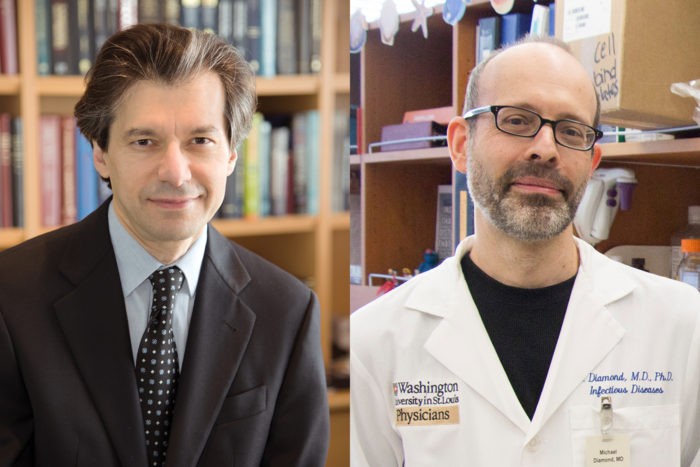Bonni, Diamond elected to National Academy of Medicine
Membership is one of highest U.S. honors in health and medicine
 Washington University
Washington UniversityNeuroscientist Azad Bonni, MD, PhD, (left) and virologist and immunologist Michael S. Diamond, MD, PhD, have been elected to the National Academy of Medicine, one of the highest honors in health and medicine.
Neuroscientist Azad Bonni, MD, PhD, and virologist and immunologist Michael S. Diamond, MD, PhD, both of Washington University School of Medicine in St. Louis, have been elected to the National Academy of Medicine, a part of the National Academy of Sciences. Membership in the organization is one of the highest honors in the fields of health and medicine in the United States.
They are among 75 regular members and 10 international members whose election to the National Academy of Medicine was announced Monday, Oct. 15. Current members of the organization elect new members based on their contributions advancing public health, health care and medical science. All members volunteer time to serve on committees examining a broad range of health-policy issues.
Azad Bonni
Bonni is the Edison Professor and head of the Department of Neuroscience at Washington University School of Medicine and director of the university’s McDonnell Center for Cellular and Molecular Neurobiology. An international leader in molecular neuroscience, Bonni has made seminal contributions to our understanding of how the brain is built at the level of individual connections between nerve cells, and how deregulation of those mechanisms contributes to neurological diseases.
His group has discovered fundamental signaling networks within nerve cells that program neural circuit assembly and function in the developing brain. Using brain development as a guide, the Bonni laboratory also has provided novel insights into neurological disorders including neurodevelopmental disorders of cognition such as intellectual disability and autism spectrum disorders, brain tumors and neurodegenerative diseases.
Bonni earned his medical degree at Queen’s University in Kingston, Ontario, and completed his residency in neurology at McGill University in Montreal. He then received his doctorate in neuroscience from Harvard University and completed postdoctoral studies at Boston Children’s Hospital. He then launched his own laboratory at Harvard Medical School, where he was a professor of neurobiology prior to moving to Washington University in 2012 to lead the Department of Neuroscience.
Bonni has received numerous honors and awards, including the Alfred P. Sloan Foundation Award, Burroughs Wellcome Award, and Klingenstein Foundation Award. He is an elected fellow of the American Association for the Advancement of Science and the Royal Society of Canada.
Michael S. Diamond
Diamond is the Herbert S. Gasser Professor of Medicine and a professor of molecular microbiology and of pathology and immunology at Washington University School of Medicine. He is also an associate director for the Andrew M. and Jane M. Bursky Center for Human Immunology and Immunotherapy Programs. He is recognized internationally for his research involving Zika, West Nile, chikungunya and related emerging viruses. He seeks to understand how these viruses cause illness and interact with and evade the body’s defenses.
He led some of the groundbreaking initial studies into Zika virus, including why and how it causes devastating neurological damage to the developing fetus. With colleagues, Diamond developed the first animal model of Zika infection during pregnancy, identified protective antibodies against the virus, showed that Zika infection reduces the fertility of male mice, and helped to develop a Zika vaccine that is now in clinical trials.
Before turning his attention to Zika, Diamond was at the forefront of research into the related West Nile virus, which began causing brain infections in the United States in the early 2000s. His experiments have helped identify potential drug and vaccine targets to prevent or treat West Nile disease.
Diamond is an elected fellow of the American Association for the Advancement of Science, a past Burroughs Wellcome Fund and Ellison Medical Foundation awards recipient, and a member of the scientific advisory board of the Investigators in the Pathogenesis of Infectious Disease program at the Burroughs Wellcome Fund.
Diamond earned his bachelor’s degree in political science from Columbia University in 1985, followed by his medical and doctoral degrees from Harvard in 1994. After completing a research fellowship in molecular and cell biology at the University of California, Berkeley, Diamond moved to the University of California, San Francisco, where he completed his residency in internal medicine and a clinical fellowship in infectious diseases. He returned to Berkeley to complete another research fellowship in infectious diseases in 2001, before joining Washington University School of Medicine that year as a junior faculty member.







